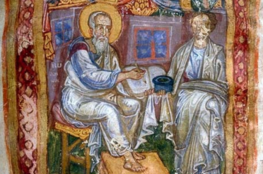Contrary to what some have murmured about in other forums, the previous two posts on Fr. John Meyendorff’s views concerning Catholic marriage and contraception were not intended as cheap shots against the Eastern Orthodox, nor were they meant to be read as easygoing vindications of contemporary Catholic praxis. As I have stated before, the Catholic Church has little-to-no “moral high ground” on the Orthodox with respect to marriage, divorce, contraception, abortion, and sexual ethics as a whole. No one should triumphalistically wave the text of Humane Vitae in the air without first acknowledging that most Catholics ignore it. Similarly, the days of condescending digs at the Orthodox over marriage dissolutions should be over, particularly in light of the fact that Pope Francis has cleared a pathway for “Catholic divorce.” Although I believe that Fr. Meyendorff was mistaken on certain points of Catholic doctrine, and exhibited a strange lack of knowledge concerning the natural-law tradition, that hardly means I think less of him as a serious scholar. His works on classical Byzantine theology, St. Gregory Palamas, and East/West relations should be required reading for any serious student of Eastern Christianity.
All thinkers have faults of course, and Meyendroff was no exception. Fr. Peter Totleben, whose contributions to this blog are always welcome, had this to say in the combox to “Meyendorff on Roman Catholic Marriage“:
A typical pattern that you see in the works of Meyendorff (especially when he is critical of Western practices) is that he takes a term, a tag, or a catch-phrase that strikes him as odd, gives it his own meaning, and then criticizes it in terms of the meaning he has given it. So he can be a bit hard to engage.
There are also some problems with Meyendorff’s historical work. He’s usually invested in a particular “side” in the historical events that he investigates. And he doesn’t really take the positions of other sides seriously. He usually is too trusting of his own party’s evaluations of its opponents, and he uncritically repeats them as if they were objective summaries of the state of affairs. And he never really consults what the opponents of his side have to say.
So, reading Meyendorff can sometimes be like letting Rush Limbaugh explain democrats to you . . .




November 11, 2015
“His works on classical Byzantine theology, St. Gregory Palamas, and East/West relations should be required reading for any serious student of Eastern Christianity.”
I found Fr Meyendorff’s scholarship very much “on the outs” at SVS. Fr John Behr demolishes his work on Palamas. His own son, Paul, absolutely rubbishes his book on marriage.
November 11, 2015
The only critique of Meyendorff’s work on Palamas that I have read has been from some neo-Orthodox Greeks who basically say he wasn’t being mean enough to the West. Do you know which of the two Palamas works Behr dislikes? Both of them? It’s also worth noting that Meyendorff put together some of the first critical editions of Palamas’s works. Even if some of his interpretations haven’t held, he certainly made important contributions to the study of Palamas in general.
What is even “in” at SVOTS these days? I do wish Behr could find a way to never teach and just focus on writing. I fear he is never going to finish his series on Christian doctrine.
November 11, 2015
It’s been awhile since I took his course on hesychasm (I wish I had my notes with me; they’re somewhere in Colorado at my folks’ house!).
The long and short of it (if I can remember correctly) is that Meyendorff totally misconstrues the entire Palamite-Barlaamite conflict as a clash between “Eastern mysticism” and “Western scholasticism.” It’s better described as a conflict between theological realism and extreme apophaticism (verging on the agnostic). Palamas said that we really can know God; Barlaam said that we really can’t.
There’s also a historical question as to how central Palamas actually was to the Orthodox tradition before his rediscovery in the 20th century, first (ironically) by a Roman Catholic author, Martin Jugie (an Augustinian of the Assumption), who dredged Palamas up from complete obscurity. Neo-Palamism, then (according to this line of argument), developed out of the Orthodox response to Jugie, and soon elevated Palamism to the level of dogma — whereas before very few Greek theologians would have known his writings (there was no printed edition of Palamas before Jugie!), and the Russian Church would have been totally ignorant of him altogether except for the fact that his name is invoked in the Second Sunday of Lent.
Finally, Fr Behr seemed to endorse the conclusion of Rowan Williams, in his article “The Philosophical Structures of Palamism”, that Palamism should be considered as little more than “a novel metaphysical experiment in Byzantine theology”, and that like Thomism, “it has been most fruitful where it has been treated with the least ‘fundamentalism'”. Williams’ article can be downloaded here:
https://drive.google.com/file/d/0B1liLAZOnI8bTW16Qlg0U29Obms/edit
November 11, 2015
Isn’t Palamas in the Philokalia? At least some of his works must have been printed in there before the 20th century, even if there were no complete scholarly editions of his works. Plus, he is in Migne’s Greek series, isn’t he? Or am I missing what you were getting at?
Thanks.
Peace,
Shane
November 11, 2015
Palamas is in the Philokalia, but it’s just bits and pieces. I don’t think any of his complete works were in print until more recent times.
November 12, 2015
Interesting. Well, you could put him up there with Julian of Norwich and Beowulf for texts which were either neglected or relatively unknown until more recent times.
November 11, 2015
Yes, and actually he wasn’t even commemorated by the Russian Church on the 2nd Sunday of Lent until after the Nikonian reforms in the 17th Century. Old Believer texts, including the ones used by the Old Rite Church of the Nativity in Erie, omit his commemoration from that Sunday.
November 11, 2015
I’d say Palamas’s name is more than simply “invoked” on the Second Sunday of Lent. The canon (and other readings) give not a bad, albeit much simplified, summary about what was important about Palamas in Orthodox tradition. In any case, the importance of a theological writer isn’t necessarily how often he’s quoted or read, or how many people have name-dropped him over the centuries, but how significantly he influenced actual thought or the direction of thought or the direction of the conversation — or maybe moreso how he synthesized a longer line of thought. I don’t think Palamas was ever really “central” to Orthodox tradition. Few, if any, are. That’s not how his importance needs to be judged. But he is certainly important and indispensable in how things have turned out.